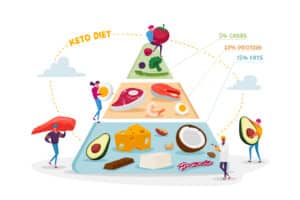Why Does the Keto Diet Increase Your Risk of Heart Disease?

The keto diet has become increasingly popular in recent years due to its effectiveness in helping individuals lose weight. However, this diet may come with some dangerous unintended consequences. A new study presented at the American College of Cardiology’s Annual Scientific Session found strong evidence that a keto-style diet can double your risk of cardiovascular disease. In particular, you may face a significantly elevated risk of issues such as chest pain (angina), heart attack, blocked arteries and stroke.
The study was conducted by the Healthy Heart Program Prevention Clinic at St. Paul’s Hospital in Vancouver. It analyzed health information from over 70,000 people in the United Kingdom. These subjects completed a one-time, self-reported, 24-hour diet questionnaire that was paired with blood tests to check their cholesterol levels. There were 305 subjects identified as consuming a keto-like diet. After an average of almost 12 years of follow-up, 9.8% of individuals with a keto-like diet experienced a new cardiac event, compared with only 4.3% of individuals on a standard diet.
How Does the Keto Diet Work?
The keto diet involves consuming high quantities of fat and low to moderate amounts of protein. In addition, consumption of carbohydrates is extremely limited as part of this diet. In general, people on a keto diet will get 70-80% of their calories from fat, with 10-20% coming from protein and only 5-10% from carbohydrates.
By severely restricting your consumption of carbohydrates and limiting your consumption of protein, it forces your body to burn its stored fat for energy. This process, called ketosis, produces chemicals called ketones that provide the fuel your body needs. Because you’re burning your reserves of fat during this process, it is an effective way to lose weight.
The Keto Diet Elevates Your Cholesterol Levels

For this reason, it’s critical to monitor your cholesterol closely if you are on the keto diet. If you see your LDL levels start to rise, you may need to discontinue the keto diet. However, due to the strong link between the keto diet and cardiovascular disease, heart doctors are beginning to recommend avoiding the diet altogether.
It’s become clear that even if you consume the healthiest fats as part of the keto diet, such as fish and olive oil, you’ll still end up consuming an unhealthy level of saturated fat. In addition, by limiting whole grains, legumes and fruits, the keto diet removes a significant amount of fiber from your diet, and this fiber is important to protect your heart.
That being said, it’s important to understand that the findings of this study are still considered preliminary, and additional research is necessary to understand the true long-term impact of the keto diet on your heart health.
South Denver Cardiology Associates Can Help You Establish a Heart Healthy Diet
Fortunately, there are other ways to alter your eating habits that will help you lose weight and are better for your heart health than the keto diet. At South Denver Cardiology Associates, we can help you learn how to improve your overall nutrition to maintain a healthy heart and achieve your desired weight.
As part of our nutritional counseling services, we’ll create an individualized nutrition plan for you that will help get you on the path to healthy eating. We also have a medical weight loss clinic where you’ll work with a team of board-certified cardiologists, nurse practitioners, registered dieticians and exercised physiologists who will help you shed excess pounds and establish important lifestyle changes to maintain a heart healthy weight moving forward.
Contact us today to schedule a consultation. South Denver Cardiology Associates serves patients in Denver, Littleton and the surrounding areas of Colorado.
- Does Vaping Increase Your Risk of Heart Disease? - July 7, 2025
- Lifestyle Factors That Increase Your Risk of Heart Disease - May 26, 2025
- 6 Tips for Exercising Outdoors with a Heart Condition - May 19, 2025
Sign Up
As with any health concerns, your specific treatment program should be discussed thoroughly with your primary care physician as well as any specialists who may need to be consulted – like a cardiologist.
Sign Up
